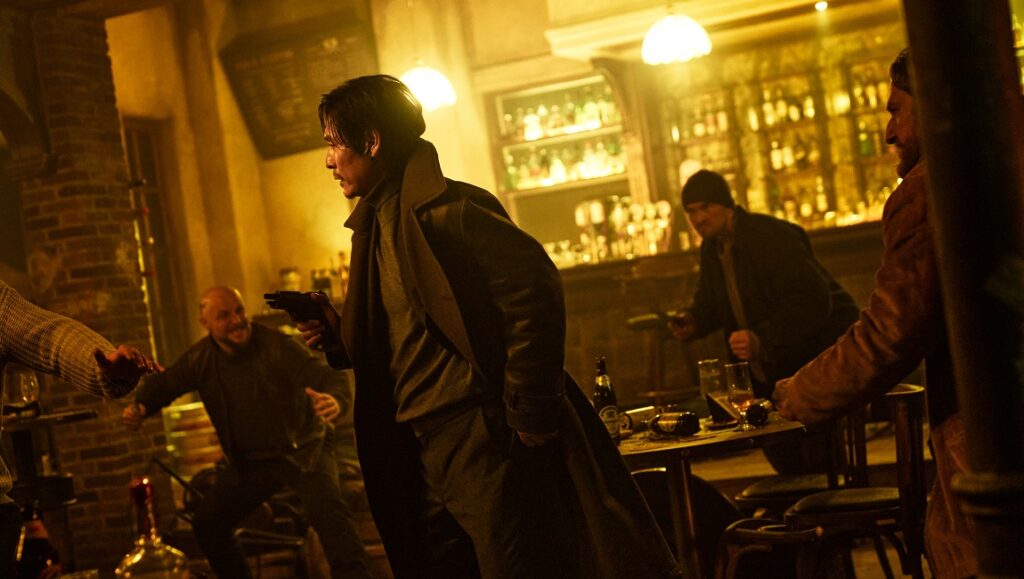Byun Sung-hyun’s Kill Boksoon belongs to a time-honored (or less generously, clichéd) subgenre of the assassin movie: the kind in which the stoic, unbelievably badass contract killer has a relationship with a young ward. It’s easy to see the draw in telling stories like these, whether they be Leon: The Professional or recent fare like Choi Jae-hoon’s The Killer. Putting a child — usually a stranger — in the care of a hitman opens up the sociopathic protagonist to a character arc, turning them into an unlikely object of empathy and making it easy to root for bloodshed. Plus, at some point or another, the kid is put in danger, giving the killer someone to save for a change. Emotional throughlines and stakes are established in one go.
Kill Boksoon is, thankfully, a bit different from this usual blueprint. In lieu of the male assassin and his surrogate child, the film’s focus is on a mother and daughter. Gil Boksoon (Jeon Do-yeon), called Kill Boksoon by her colleagues, is a middle-aged murderer struggling to connect with her fifteen-year-old daughter, Jae-young (Kim Si-a). While her work life is definitely affecting her home life and vice versa, Boksoon’s struggles with her daughter never come off as the contrived plot device of an action movie, but instead reflect the everyday difficulties of being a single mother with a career. It just so happens that this career involves ultra-violent, stylish death-dealing.
Boksoon does her killing for a company called MK, a clandestine operation in an ecosystem with other companies that, by and large, follow the rules set by MK. These rules keep killers in line and prevent those outside of the employ of companies from doing unsanctioned hits. It’s a little like the worldbuilding done in John Wick, but less flamboyant and far less detailed. Still, despite not being especially fleshed out, an awful lot of the film’s time seems spent on the minutiae of contract killing’s labor laws, rather than the film’s supposed mother-daughter core.
That so many of the goings-on of Kill Boksoon feel like distractions is the film’s most frustrating flaw. While it’s refreshing that Jae-young is not put in danger simply for the sake of plot, the sustained separation of Boksoon’s domestic life and work leaves the film feeling unfocused and cluttered. There are essentially two separate plots, the one in which Boksoon decides she can’t follow through with a hit, earning the ire of MK, and the one in which Jae-young stabs a classmate who threatens to out her and her girlfriend to the entire school. Boksoon dealing with either situation is a solid enough foundation for its own movie, but they only tenuously come together here as Jae-young comes close to discovering what her mother does for work. Meanwhile, the film uses other characters, like Boksoon’s boss, and flashbacks to reflect themes of parental figures and generational trauma instead of fleshing out its central relationship. Whenever Boksoon doesn’t pick up a phone call from her daughter, it feels as though the filmmakers are also ignoring the call. The film even goes so far as to pair Boksoon with a young intern at her company, an obvious mirror for her daughter who can be put in all the lines of fire Jae-young is spared.
Yet although it might be overstuffed, overlong, and unfocused, Kill Boksoon is rarely less than entertaining, all of its individual parts working as they should, even when they don’t come together. The action scenes are frenetic, brutal, and a lot of fun, directed with a style that doesn’t sacrifice their clarity. Both the choreography and the script possess a keen sense of levity that keeps the film from self-seriousness without ever tipping over into quip-a-minute slop. In the film’s opening fight scene, Boksoon’s yakuza opponent details the storied history of his four-centuries-old wakizashi blade, and Boksoon replies that the ax in her hand can be purchased on the cheap at Walmart. Elsewhere, a series of knives all find their way into the same unintended target in the middle of the film’s best action sequence, a fight scene that splits into two groups of combatants and cuts between them as they slam into opposite sides of the same wall. The myriad of littered pleasures means that, while Kill Boksoon doesn’t totally add up to the sum of its parts, most of those parts are worth it anyway.
You can currently stream Byun Sung-hyun’s Kill Boksoon on Netflix.
Published as part of InRO Weekly — Volume 1, Issue 13.


Comments are closed.